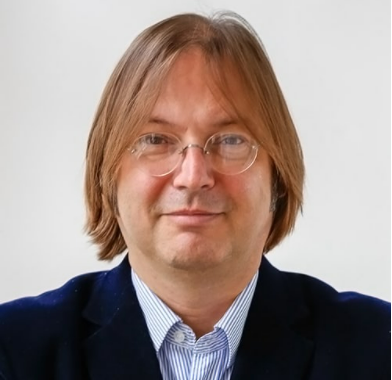Keynote-Vortrag

Kann man Komplexität verstehen? Wenn ja – was bringt das?
Univ.-Prof. Mag. DDr. Stefan Thurner
Leitung Institut für Wissenschaft Komplexer Systeme, MedUni Wien / Leitung Complexity Science Hub Vienna
Was heißt das, wenn wir sagen, die Welt wird immer komplexer? Wir besprechen was Komplexität mit Netzwerken zu tun hat und wieso es so schwer bzw. unmöglich ist, Komplexität zu managen. Komplexe Systeme haben die Eigenschaft, dass die sich ändern können und manchmal, an sogenannten Tipping Points, rapiden Umbrüchen unterworfen sind. Klimawandel, Digitalisierung und Pandemie sind Beispiele, wie Umbrüche in Gesellschaften aussehen können. Wir diskutieren, wie die wissenschaftliche Sichtweise von Komplexität beitragen kann, Komplexität zu verstehen, um komplexe Systeme früher oder später dennoch managen zu können.
Kurzbio Stefan Thurner
Stefan Thurner is full professor for Science of Complex Systems at the Medical University of Vienna, where he chairs the Section for Science of Complex Systems. He is external professor at the Santa Fe Institute and President of the Complexity Science Hub Vienna.
Stefan obtained a PhD in theoretical physics from the Technical University of Vienna and a PhD in economics from the University of Vienna. He held PostDoc positions at Humboldt University of Berlin and Boston University before joining the faculty of the University of Vienna and later Medical University. His habilitation is in theoretical physics.
Stefan started his career with contributions to theoretical particle physics and gradually shifted his focus to the understanding of complex systems. He has published more than 240 scientific articles ranging from fundamental physics (topological excitations in quantum field theories, statistics and entropy of complex systems), applied mathematics (wavelet statistics, fractal harmonic analysis, anomalous diffusion), network theory, evolutionary systems, life sciences (network medicine, gene regulatory networks, bioinformatics, heart beat dynamics, cell motility), economics and finance (price formation, regulation, systemic risk) and lately in social sciences (opinion formation, bureaucratic inefficiency, collective human behavior, efficiency of healthcare systems). He holds two patents.
Stefan's work has been covered extensively by Austrian as well as international media such as the New York Times, BBC world, Nature, New Scientist, Physics World, and is featured in more than 500 newspaper, radio and television reports. Stefan was elected Austrian “scientist of the year” in 2017.